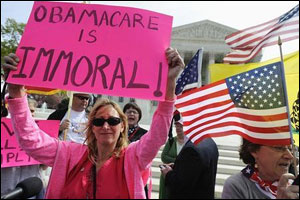 | « Back to article | Print this article |
India’s health insurance scheme for the poor seems to be creating buzz globally. The Brookings Institution, a think tank associated closely with the US administration, recently expressed keen interest in it and admitted to looking up to the programme for inputs for ‘Obamacare’ - a term widely used for the US’ revamped healthcare programme.
 The Rashtriya Swasthya Bima Yojana (RSBY), launched in 2008 and implemented by the labour ministry, travelled all the way to Brookings’ round-table discussion in Washington on February 28. Anil Swarup, the labour welfare director-general and additional secretary in the ministry, made a presentation. “They were fascinated by the scheme and the way one state’s data could travel through another via the national IT platform,” he says.
The Rashtriya Swasthya Bima Yojana (RSBY), launched in 2008 and implemented by the labour ministry, travelled all the way to Brookings’ round-table discussion in Washington on February 28. Anil Swarup, the labour welfare director-general and additional secretary in the ministry, made a presentation. “They were fascinated by the scheme and the way one state’s data could travel through another via the national IT platform,” he says.
In the US, states do not have interconnect technology platforms; each has its own. RSBY’s single national platform enables its smart card to be portable. A beneficiary from Bihar can get treated in a Mumbai or Kochi hospital and the bills are paid in his home state by the insurance companies linked to the scheme. It is this aspect that has fascinated Brookings, Swarup adds.
On being asked about Brookings’ role in ‘Obamacare’ and its interest in RSBY, the think tank’s fellow and the managing director of its Engelberg Centre for Health Care Reform, Kavita Patel, told Business Standard: “Many of us, including myself, advise the administration. I think, RSBY will help serve as a point of reference for the health programme to understand how best to deal with secure data issues.”
For payment of a small premium of Rs 30 a year, RSBY offers free treatment (worth up to Rs 30,000 a year) at an enrolled government or private hospital. Under the scheme, each beneficiary family is given a biometric smart card that can be used anywhere in the country. Initially limited to people below the poverty line, the programme is gradually reaching out to the general population in states like Kerala. Currently, it covers 120 million beneficiaries, with 34 million cards in use.
Brookings’ Patel adds: “Another aspect of interest was (RSBY’s) data infrastructure. As we bring over 30 million more US citizens under insurance next year (2014), we are still struggling with this. RSBY was able to be implemented using a secure laptop and video verification; and then the data were transmitted securely to a central location. This is an issue we are facing, to an extent. So, we were eager to hear from the people who devised the initial RSBY data infrastructure.” She also lauded RSBY’s outcomes, with mortality rate decreasing and screening and treatment among women increasing.